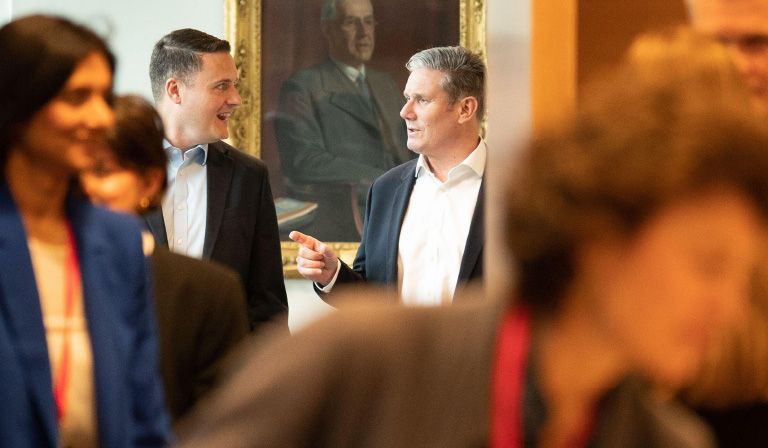There are two genres of political memoir: what-I-did and who-I-am. Retired politicians write the former: long, self-justifying accounts of life on the political frontline; why I did this, why I didn’t do that; why we needn’t dwell on that. Ambitious politicians on the way up write the second kind: artfully shaped life stories peopled by loving mothers and deadbeat dads, or deadbeat mothers and loving dads, in which trials, tribulations and triumphs illuminate the author’s most deeply held values and position on tax reform.
The model for the first genre is Churchill, who had rather a lot of ground to cover. We await Liz Truss’s contribution with bated breath. The second genre is more common in America than Britain and is typified by Barack Obama’s The Audacity of Hope, with its fusion of the political and the personal. Keir Starmer was planning to write one of these but dropped the idea earlier this year, much to everyone’s relief (rumoured title: The Comfort of Low Expectations).
You might expect Wes Streeting’s new book to fit the who-I-am genre, since Streeting is ambitious and on the way up. In fact, it fits neither model. One Boy, Two Bills and a Fry Up is a memoir by a politician that is barely a political memoir at all, which makes it human, endearing and a little unsatisfying.
The fry-up begot the boy. In May 1982, Streeting’s mother Corinna was newly 18, poor and pregnant by her 17-year-old boyfriend, by accident. At the insistence of her mother, Libby, she made an appointment for a termination. The hospital warned her not to eat anything before coming in. But Corinna, who lived with her mum and two siblings in a three-bedroom council flat in Stepney Green, woke up that morning determined to have her baby. So she cooked herself breakfast. By the time Libby got to the kitchen, the plate was empty, and Corinna could tell her furious mother, and herself, that there was no going back. Hence the book’s title—and its author.
Nanny Libby, a chain-smoking cyclone of a woman, loomed large in Streeting’s early life. She was loyal, loving and ferocious. When she found out that Corinna had been abused by a boyfriend, she tracked him down and beat him with a bicycle chain. A tireless activist, she was heavily involved in campaigns against the Thatcherite regeneration of London’s docklands. When Rupert Murdoch relocated News International to Wapping, she joined the picket lines. A Labour party stalwart, Libby was invited to stand for the local council more than once, but always refused, partly because she was ashamed of her criminal record.
This came about as a result of her marriage to one of the two Bills in the book’s title. After a childhood scarred by terrible abuse, Bill Crowley became a low-level gangster in south London, expert in burglary and armed robbery, in and out of borstal and prison. He wore a rubber mask with grey hair when carrying out his crimes. Yet Bill was handsome and funny and dapper, and young Libby fell for him. He persuaded her to join him in robbing the homes of rich families in the countryside. When they were caught, they both went to prison. Libby shared a cell in Holloway with Christine Keeler, the model at the heart of the Profumo affair, with whom she forged an enduring friendship. She was under guard and handcuffed when she gave birth to Corinna.
Crowley was always nice to Streeting, and, while condemning his crimes, Streeting clearly retains deep affection for him. But young Wes was closer to his father’s father, the other Bill: Grandad Bill Streeting. This Bill was always on the right side of the law. He served in the Royal Navy during the Second World War and was immensely proud of it. Then, after failing his application to join the police (too short), he went to work on the docks. Grandad Streeting was a devout Christian who believed in the virtue of hard work, and a staunch Tory. He was the biggest influence on Wes’s early life, other than his mother.
Streeting’s biggest fear was not rejection by his family, but by his Maker
Streeting inherited his grandad’s religious faith. As a child, he did Bible study after school and attended church every Sunday. He wasn’t just going through the motions; he was, and is, a believer. Coming out as gay, as he did while at university, was an ordeal, but his parents were understanding (“I’ve always wanted to be a trendy mum,” said Corinna). His biggest fear was not rejection by his family, but by his Maker: “I was afraid of God. The God of the Old Testament.”
Streeting details the hardships, terrors and humiliations that accompany poverty, but this is not a misery memoir. In some ways, Streeting was lucky. His sprawling, ever-shifting extended family was always around him, in one form or another; he was never alone, even when he wanted to be. His mother read to him and encouraged his love of books. He was the star pupil at every school he went to. Teachers went above and beyond to help him jump the extra hurdles that lie in the way of poor kids who want to get to university, as did mentors he met through the years, including the late historian Lisa Jardine.
With their support and against all the odds, he got to Cambridge, to study history. It was there that he fell in with a bad crowd: student politicians. Ever since he was a teenager, Streeting has been a self-described politics junkie. When his school held a mock election in 1997, he chose to be a Labour candidate, apparently on the basis that New Labour seemed fresh and exciting, and Ann Widdecombe, whom he had seen on television, did not. From then on, he set his sights on becoming a Labour MP.
At school, he was the proud owner of Tony Blair’s book New Britain: My Vision of a Young Country. But at university, as he took up student politics, he was frequently in conflict with Blair’s government. As president of the Cambridge Student Union, he campaigned against New Labour’s tuition fees. He opposed the Iraq War and briefly resigned from the party over it. In 2010, on behalf of the National Union of Students (of which he had also been president), he pushed for parliamentary candidates to sign a pledge against further rises in tuition fees, a tactic that brought him into direct conflict with Gordon Brown’s minister for universities, Peter Mandelson.
All of this is mentioned in passing, in the course of Streeting’s breathless, one-thing-after-another narrative. He never pauses to explain why he was so strongly drawn towards politics. There are nods towards his desire, no doubt sincere, to expand opportunity for others like him, but no sense of politics as a clash of ideas, moral intuitions, ideologies, or even personalities. We read nothing about Streeting’s relationship to Labour’s cross-cutting currents and factional tensions. We don’t know what Blair meant to him—nor any of the other politicians who commanded the stage during Streeting’s formative years. We don’t know whether he changed his mind about New Labour or tussled with its contradictions.
Why did Streeting decide his memoir should be devoid of political substance or self-interrogation? I would have guessed nervousness at the ramifications, but one of Streeting’s notable characteristics as a politician is his confidence. When he was NUS president, he got his media practice in, and it shows. In front of a microphone, he is charming and fluent, with a quick sense of humour. He frames issues in common-sense terms, rarely resorting to the clunky jargon to which Labour politicians, in particular, are prone.
He has a steeliness to him, too, as you might expect from someone who made it from a Stepney housing estate to the House of Commons. There is a clip from 2017 of him going head-to-head with Ken Livingstone on Newsnight, when Livingstone was in trouble for pursuing his bizarre obsession with Hitler and Zionism. Streeting calmly and unblinkingly sets about him with a bicycle chain.
That was not a one-off. Streeting certainly isn’t afraid of getting into fights with the left of his party. He has aligned himself with Labour’s right and often pokes the other side with a stick. His exceptional (for Westminster) background and his sexual orientation offer him a moral authority on questions of social equality that most of his colleagues cannot match, and he presses the advantage. You get the impression that he likes to show the posh kids who claim to represent working-class people what life really looks like through the window of a council flat.
Why did Streeting decide his memoir should be devoid of political substance or self-interrogation?
The question that isn’t answered by his book is to what extent his antagonism towards the hard left is rooted in his personal or political journey. It’s frustrating, because the bones of a who-I-am book are visible in One Boy, Two Bills and a Fry Up. Among his close family, Streeting was exposed to two very different political worldviews: the pre-Blair Labour politics of Nanny Libby and the traditional conservatism of his grandfather and father. Growing up, he saw how the state can make its dependents feel helpless and humiliated; he also saw how claimants can game the system, as his mother did to get a better council flat. It’s a rich stew that goes a long way to explaining how Streeting ended up in the Labour party but on the wing of it that emphasises patriotism, personal responsibility and pragmatism. But he neglects to offer the reader any help picking those bones out.
While Streeting appears to be highly confident, the evasions and the missed opportunities of this memoir make me wonder how deep his confidence goes. In One Boy, he conveys, simply but affectingly, how being poor can feel like having a shameful secret. He constantly had to worry about not having the right school uniform. He also carried the secret of his sexuality, which he kept from his family and friends (and his priest) until adulthood. In theory, he no longer has to worry about either, but the fear of self-revelation must be hard to shake.
Streeting is regarded as a leading contender to succeed Starmer. Youthful enough to be in tune with younger voters, he is also liked by grannies. His round face, ready smile and smooth skin give him the air of a favourite son, the golden boy he was at school and in his family. Politics is a long game, however, and he is relatively new to it. To put it bluntly, he hasn’t done much yet (in his book, he describes a Facebook campaign to persuade HSBC to extend the period of interest-free student overdrafts as one of his proudest achievements). This is hardly his fault. He’s 40 and he’s been an MP for eight years, and only in opposition, most of it under Jeremy Corbyn.
But if, as now seems likely, he becomes secretary of state for health, nominally in charge of a health service in crisis, he will be buffeted and scoured by harsh political winds. His plans for reform will be fiercely opposed within his party and beyond it. As a student activist, he organised and spoke at countless protests; now he will be protested and campaigned against. It will be fascinating to watch how he copes with unpopularity.
Streeting is used to difficulty, however. In 2021, he was diagnosed with kidney cancer. The book opens with him getting the news while in a car park in Bury, during a local election campaign (he was successfully treated). Yet despite everything that he’s been through, he can still come across as a precocious kid who enjoys showing off his skills and besting the adults. One of the most interesting and consequential subplots in British politics over the next decade or so will be the coming-of-age of Wesley Streeting. I hope he writes about it some day.














